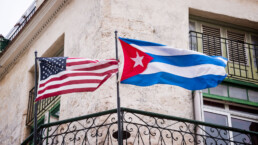The president’s appointment of former senator Chris Dodd as an envoy indicates he wants to do more, but time is running out.
by William LeoGrande, Responsible Statecraft
The next nine months offer a window of opportunity for improving U.S.-Cuban relations if leaders in Washington and Havana have the political will and courage to seize it.
Diplomats in both the State Department and Cuban Foreign Ministry profess to want to build a more constructive relationship to replace the poisonous one President Donald Trump created, and they express guarded optimism about the possibilities. But time is short. By next fall, the U.S. presidential election season will be gearing up, making any major policy change politically perilous and much less likely.

Over the past nine months, both Washington and Havana have taken small steps to reduce tensions. Last April, Washington agreed to resume the semi-annual migration talks mandated by the 1994 U.S.-Cuban migration agreement, but broken off by Trump in 2018. With tens of thousands of Cubans arriving on the U.S. southern border monthly and thousands more landing on Florida’s south coast and keys, the Biden administration had an urgent interest in regularizing Cuban immigration.
Since then, there have been two rounds of talks which both sides describe as constructive and productive. Washington has restaffed its embassy and reopened consular services so that, for the first time in five years, the United States met its obligation under the 1994 agreement to provide Cubans with 20,000 immigrant visas annually. Cuba agreed to accept flights of deportees who enter the U.S. illegally along the southern border. The success of the migration discussions has led to a resumption of diplomatic dialogues on a range of issues of mutual interest.
Recent Posts
‘Unconstitutional. Unethical. Authoritarian.’ ICE Bars Millions Of Immigrants From Bond Hearings
July 18, 2025
Take Action Now One watchdog said the new policy “seems like a blatant attempt to stop them from exercising their right to due process.”……
Americans Are Not Nearly Alarmed Enough About Climate Change
July 18, 2025
Take Action Now Americans still don’t comprehend how imminent, dangerous, and far-reaching the threat is—and journalists are partly to blame.By…
The IRS Is Building A Vast System To Share Millions Of Taxpayers’ Data With ICE
July 17, 2025
Take Action Now ProPublica has obtained the blueprint for the Trump administration’s unprecedented plan to turn over IRS records to Homeland Security…
Israel’s Sudden Assault On Syria Is Unchecked Aggression
July 17, 2025
Take Action Now Jerusalem is bombing Damascus and threatening al-Sharaa’s rule, while Washington was hoping to help the nascent government on…




